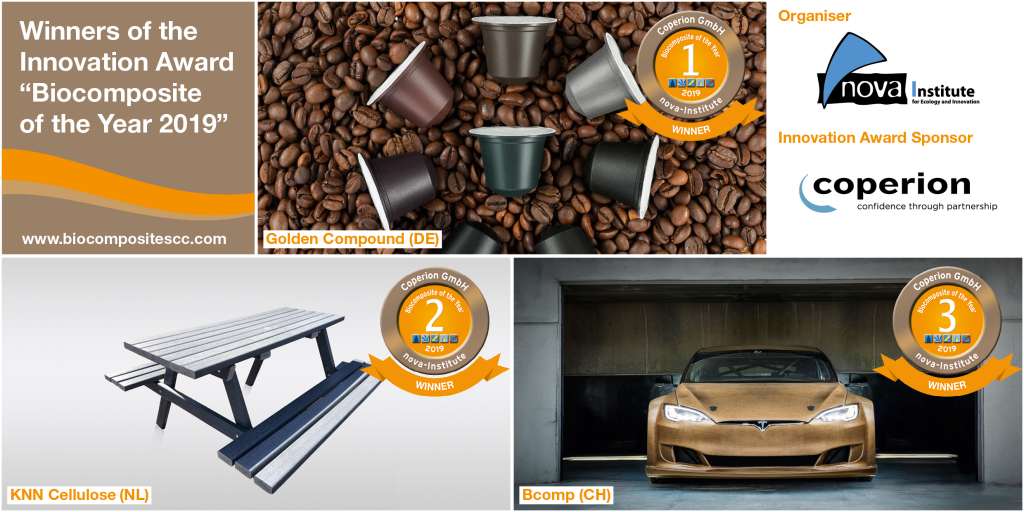Golden Compound from Germany won the first place with its certified home compostable coffee capsules. KNN Cellulose from the Netherlands took second place with their biocomposite granulates made from recycled toilet paper. And Bcomp from Switzerland achieved third place with their powerRibs™, a composite material made of natural fibres for high-performance applications in lightweight construction.
Visuals, German version and PDF file available at http://nova-institute.eu/press/?id=153
For the seventh time in a row, the “Biocomposite of the Year” innovation award was bestowed to producers and developers of innovative and new applications for biocomposites. The award ceremony took place at the world’s largest conference on biocomposites: The “8th Biocomposites Conference Cologne” (www.biocompositescc.com). With 200 participants, mainly from industry, and 30 exhibitors, the conference was once again the meeting place for developers, producers and potential users worldwide. An interesting aspect was the large number of new companies that have taken up and further professionalised the topic of biocomposites in recent years. These include large companies from Sweden and Finland as well as start-ups from various countries. Market analyses of nova-Institute show a production volume of 470,000 tonnes in Europe for the year 2018, in two years 500,000 tonnes will be exceeded.
Never before has the demand for alternatives to classic plastic products been greater than today. Currently, up to 80% of plastics can be replaced by biogenic fillers such as wood flour and cork or by natural fibres for reinforcement. By now, biocomposites are available for almost every application: packaging, consumer goods, toys, handles, shoes, façade and terrace elements, floors, car parts and even furniture. This years’ nominated companies provided a good overview of the growing application sectors for biocomposites: automotive, packaging, consumer goods, cladding, music instruments and facade elements.
nova-Institute is delighted to announce the winners, showcasing the full versatility of the biocomposite industry:

1st place
Golden Compound (DE): HOMEcap – Home Compostable Coffee Capsules for Home Use
HOMEcap is the world’s first and only home compostable coffee capsule certified with “OK Kompost HOME”. It was successfully launched on the market at the beginning of the year. Biodegradation in home compost avoids considerable waste streams. The HOMEcap is made from a unique compound comprising PTTMCC Biochems bio-based polymers PBS and PBSA mixed with sunflower seed shells and inorganic fillers. It comes with a paper and cellulose based lid, sealable to the capsule without additional glue, home compostable as well. The material composition results in low oxygen transmission rates, which allows to avoid additional barrier packaging and is therefore reducing waste. A VDI 4605 sustainability assessment showed that this capsule outperforms current state of the art capsules, like deep-drawn PP EVOH multilayer capsules, in terms of sustainability.
More information: www.golden-compound.com
2nd place
KNN Cellulose (NL): Recell® Biocomposites –The Competitive Alternative
The biocomposite of the Dutch company Recell® is a granulate with competitive prices and a low environmental impact. The biocomposite material is made from recycled toilet paper, which is separated at a sewage treatment plant, and can be mixed with a variety of polymers such as bio-based polymers, PLA or PHA. The product fits ideally into the recycling economy as it adds value to previously unused cellulose waste streams. The granules are suitable for standard injection moulding and extrusion lines. Current applications are e. g. flower pots, claddings, fences, terrace planks and boxes. Recell® took part in the competition with a picnic table from Ecodeck. Recell® cellulose fibres are efficiently recovered in wastewater treatment plants using Cellvation® technology. The treatment plants benefit from lower operating costs, increased processing capacity and the reuse of cellulose fibres that would otherwise have to be incinerated. This reduces both the ecological footprint of the fibres and that of the wastewater treatment plants.
More information: www.recell.eu
3rd place
Bcomp (CH): PowerRibs™ – Sustainable Lightweighting
The Swiss company Bcomp has developed proprietary light-weighting solutions for high performance applications by applying latest knowledge on composites to natural fibres. Thanks to powerRibs™ technology, a reinforcing grid inspired by the thin veins in leaves that provides maximum stiffness at minimum weight, natural fibres can achieve the performance of carbon fibres in a motorsport body and thus replace them. The result is a 75% reduced CO2 footprint, 30% lower costs and improved safety without toxic dust and sharp shattering, as well as viable end-of-life options. Above all, however, powerRibs™ makes car interior coverings up to 40% lighter.
More information: www.bcomp.ch
nova-Institute wants to thank Coperion (DE) for its support of the innovation award “Biocomposite of the Year 2019”. The nova-Institute would also like to acknowledge the following sponsors: Amplify Si by Dow (US), Biowert (DE), ISCC (DE), Linotech (DE), Sulapac (FI), SWK Innovation (DE) and VTT (FI).
Source
nova-Institut GmbH, press release, 2019-11-19.
Supplier
Bcomp Ltd.
Golden Compound
KNN Cellulose BV
nova-Institut GmbH
Share
Renewable Carbon News – Daily Newsletter
Subscribe to our daily email newsletter – the world's leading newsletter on renewable materials and chemicals









